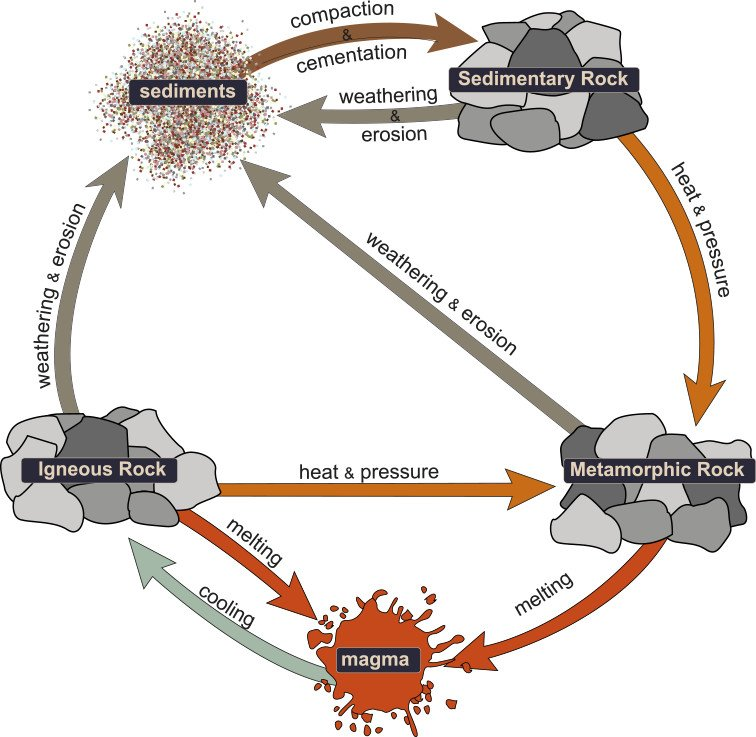
Draw the diagram of a Rock cycle and explain it.
Answer
561.6k+ views
Hint: Rock cycle is a process that creates and transforms the various types of rocks found in the earth's crust.
There are various types of physical changes like melting, cooling, deforming, compacting or eroding that occurs in the process of Rock formation.
Complete answer:

There are basically three types of rocks:-
1. Igneous rocks
2. Sedimentary rocks
3. Metamorphic rocks
Rock cycle steps :-
1. When magma cools down to a temperature where it can no longer remain in a liquid state it turns into igneous rocks.
2. When igneous rocks are subjected to the extreme natural conditions where the process of weathering and erosion takes place, these rocks change to form sediments.
3. These sediments remain compact and cementfies to form sedimentary rocks.
4. When sedimentary rocks come in contact with heat and pressure for a longer period, it changes its state to metamorphic rock.
5. When metamorphic rock is subjected under high temperature for a longer period, it melts to form magma.
6. Igneous rock will form metamorphic rocks when it comes under heat and pressure to alter and recrystallize in a continuous cycle.
7. When metamorphic rock will face weathering and erosion it will change its state to sediments.
8. Further, when igneous rocks will stay under high temperature where it no longer can continue its solid state it Melts to form Magma.
Note: A rock that cools down within the earth is called intrusive or Plutonic rock. It cools very slowly producing a coarse grained texture such as the Rock Granite.
There are various types of physical changes like melting, cooling, deforming, compacting or eroding that occurs in the process of Rock formation.
Complete answer:

There are basically three types of rocks:-
1. Igneous rocks
2. Sedimentary rocks
3. Metamorphic rocks
Rock cycle steps :-
1. When magma cools down to a temperature where it can no longer remain in a liquid state it turns into igneous rocks.
2. When igneous rocks are subjected to the extreme natural conditions where the process of weathering and erosion takes place, these rocks change to form sediments.
3. These sediments remain compact and cementfies to form sedimentary rocks.
4. When sedimentary rocks come in contact with heat and pressure for a longer period, it changes its state to metamorphic rock.
5. When metamorphic rock is subjected under high temperature for a longer period, it melts to form magma.
6. Igneous rock will form metamorphic rocks when it comes under heat and pressure to alter and recrystallize in a continuous cycle.
7. When metamorphic rock will face weathering and erosion it will change its state to sediments.
8. Further, when igneous rocks will stay under high temperature where it no longer can continue its solid state it Melts to form Magma.
Note: A rock that cools down within the earth is called intrusive or Plutonic rock. It cools very slowly producing a coarse grained texture such as the Rock Granite.
Recently Updated Pages
Master Class 10 Computer Science: Engaging Questions & Answers for Success

Master Class 10 General Knowledge: Engaging Questions & Answers for Success

Master Class 10 English: Engaging Questions & Answers for Success

Master Class 10 Social Science: Engaging Questions & Answers for Success

Master Class 10 Maths: Engaging Questions & Answers for Success

Master Class 10 Science: Engaging Questions & Answers for Success

Trending doubts
What is the median of the first 10 natural numbers class 10 maths CBSE

Which women's tennis player has 24 Grand Slam singles titles?

Who is the Brand Ambassador of Incredible India?

Why is there a time difference of about 5 hours between class 10 social science CBSE

Write a letter to the principal requesting him to grant class 10 english CBSE

A moving boat is observed from the top of a 150 m high class 10 maths CBSE




